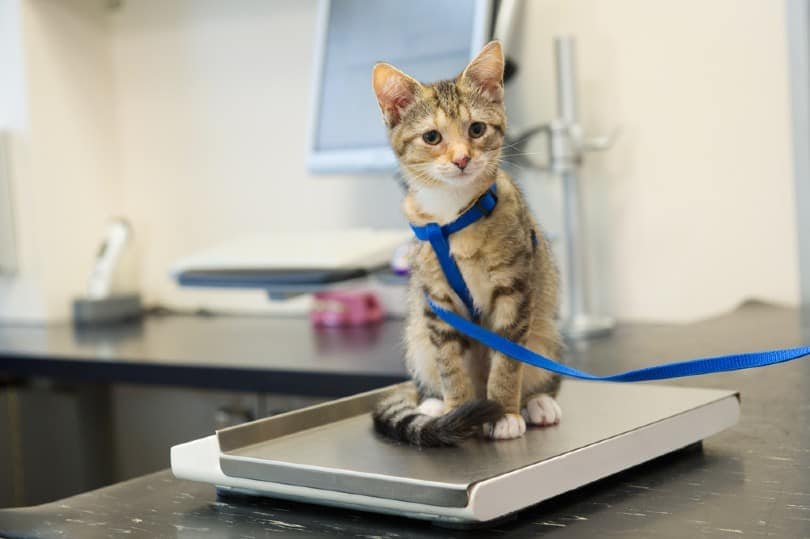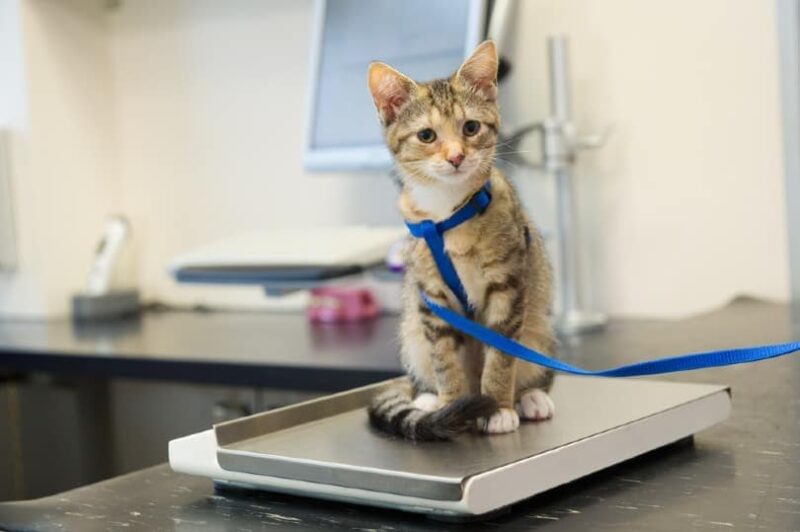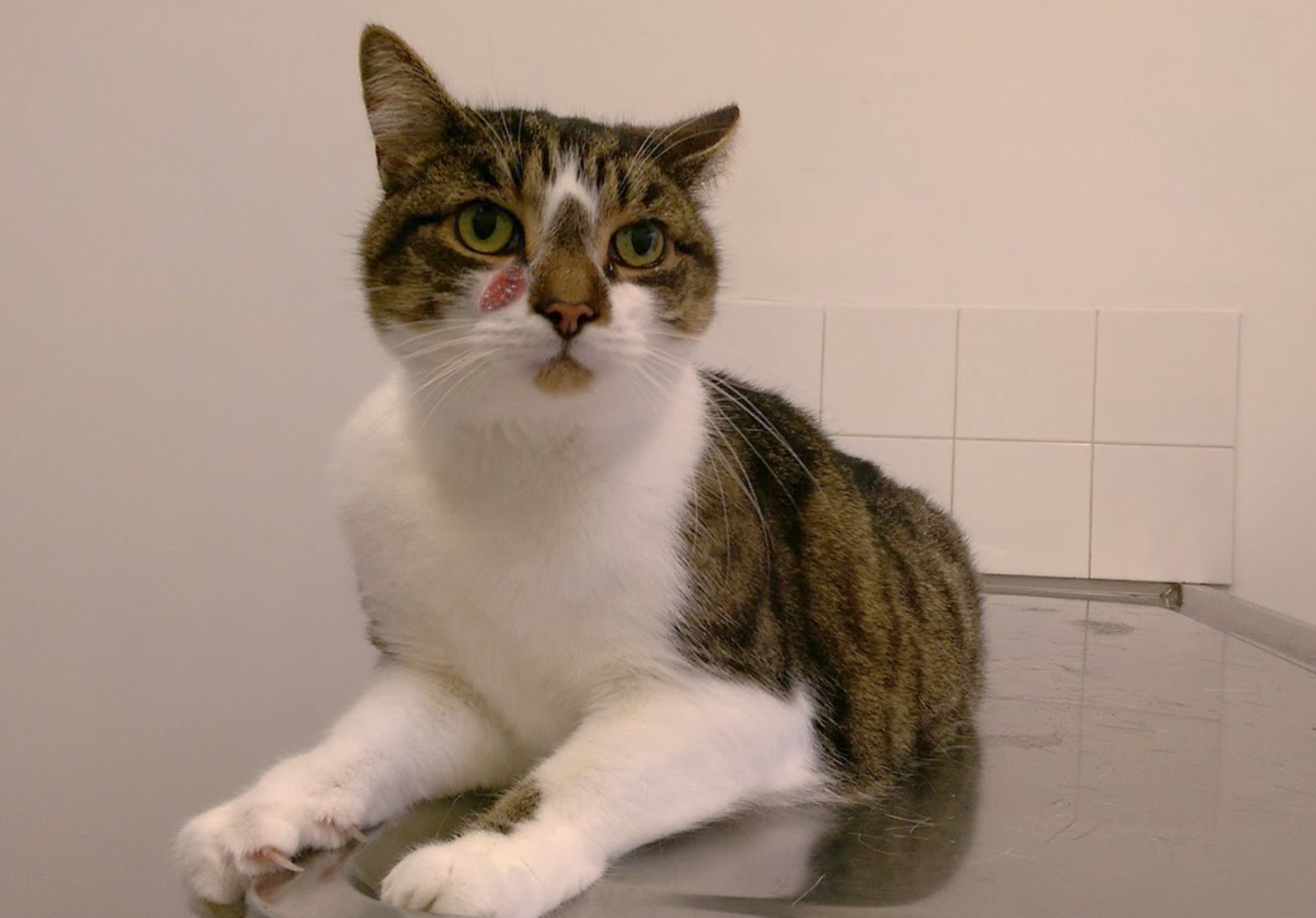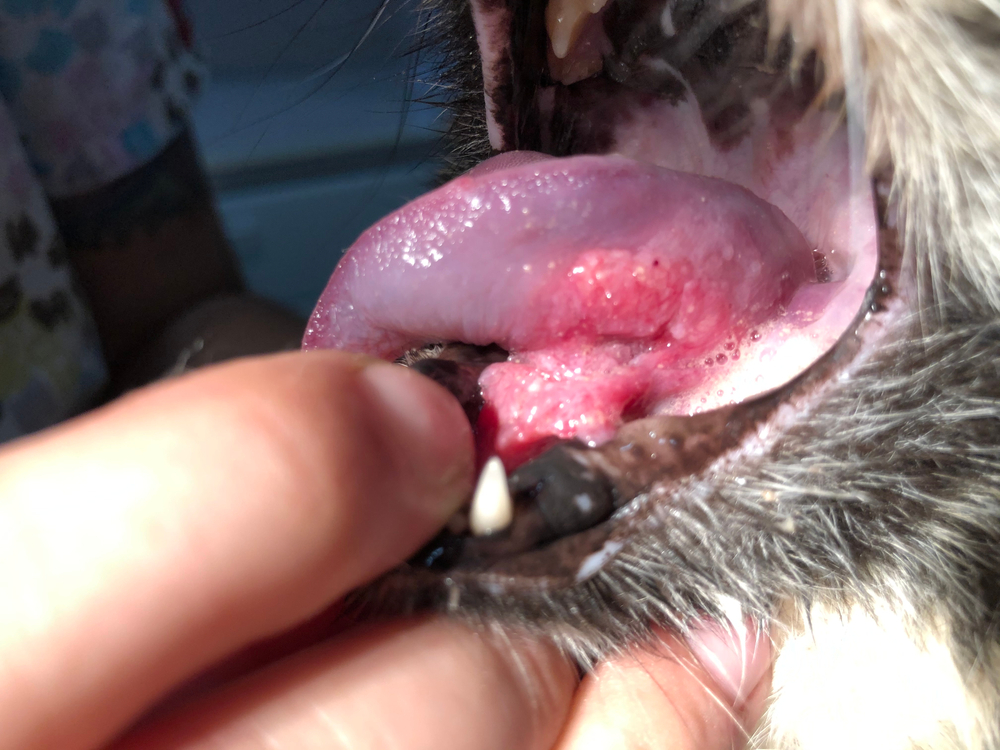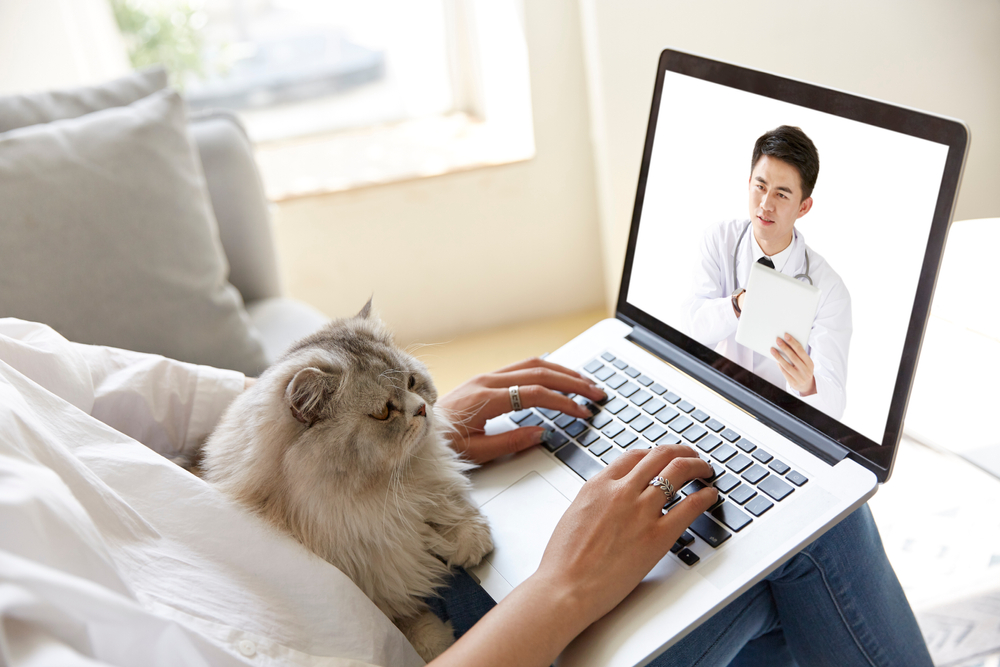Monitoring your cat’s weight is a great way to get a hint about how well they are eating and if their overall health is on track. Kittens should steadily gain weight until they reach adulthood, after which, their body weight should be maintained. If you notice your cat losing weight, you are right to be concerned. There are several reasons that your cat may suddenly lose weight, and some of these can be caused by serious illnesses. Read on to learn more about how to monitor your cat’s body weight and what to do if your cat is too thin.

How Do I Know If My Cat Is Underweight?
Even if your cat isn’t rapidly losing weight, you might be concerned if they appear to be too thin. The best way to tell if your cat is underweight is by evaluating their body condition score (BCS). The BCS is used to describe a cat’s body shape and can be used for all breeds of adult cats. The score ranges from 1 to 9, with 1 describing a cat as “severely underweight” and 9 as “morbidly obese.” An ideal score on this scale is 5.
A cat with a BCS of 5 will have a visible waist when observed from above, and the ribs should not be visible but easily felt with a slight amount of pressure. You can take a look at the score chart from the World Small Animal Veterinary Association1 to get a better idea of where your cat sits on this scale.
If you notice that your cat’s ribs and spine are prominent on your cat’s body, they are underweight and likely have a BCS below 4. This should prompt an appointment with the veterinarian to get your kitty checked out for any serious illnesses.
Ideal Cat Cat Weight Illustration
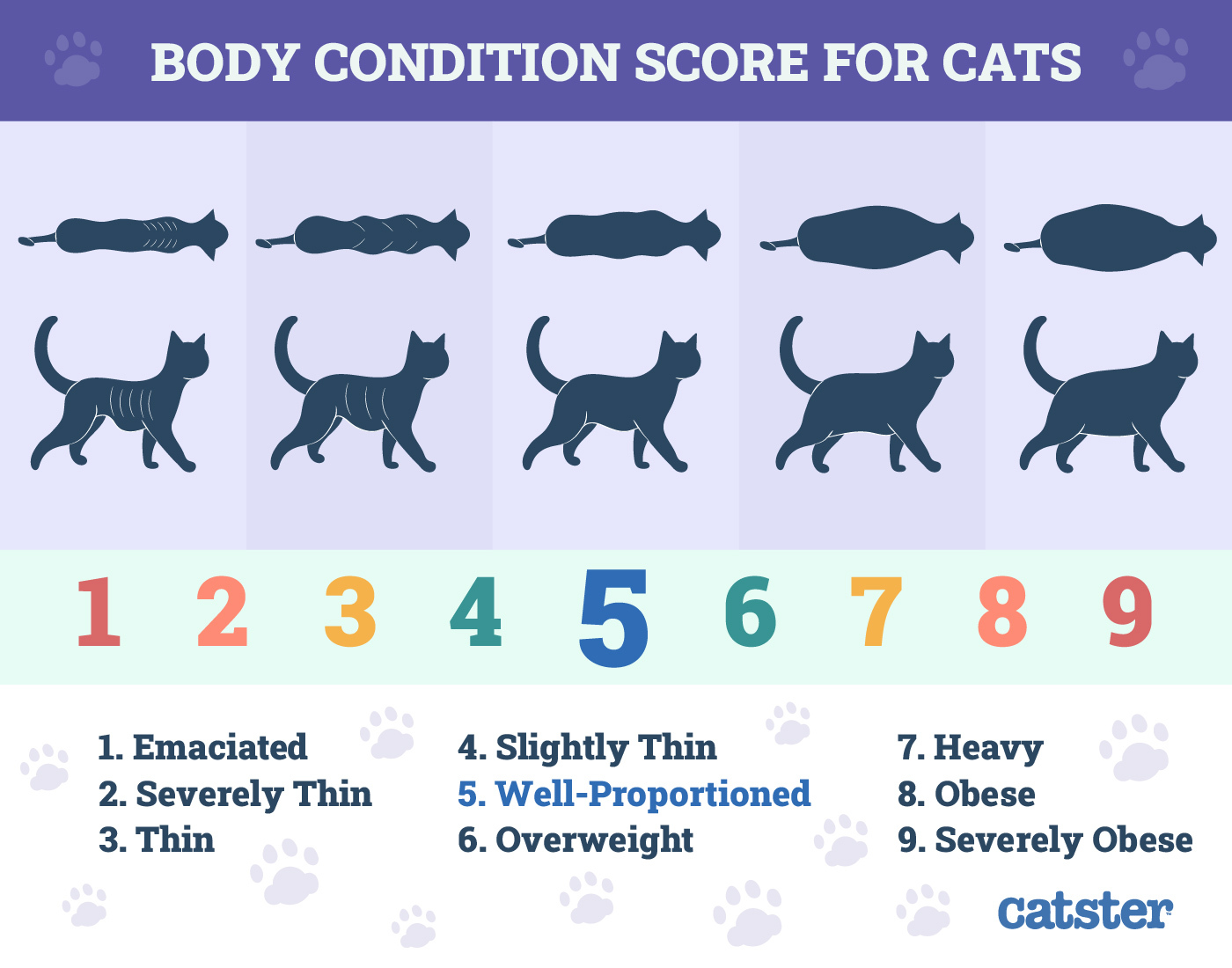

How to Get an Older Cat to Gain Weight?
Cats are known to gradually lose weight when they become seniors at around 12 years of age. Even though this is common, you should still book yearly appointments with your veterinarian to ensure that your cat’s health is on track. As cats enter their golden years, they may have a reduced ability to digest and acquire the nutrients in their food.
You may want to choose a food with a high caloric content and protein content to counteract any decreases in digestibility and loss of muscle mass. Another thing to consider in older cats is that they may have a decreased ability to smell and taste their food. One adjustment that can overcome this is the use of a high-moisture canned diet, which readily releases aromas and is more flavorful than dry kibble.
What If My Cat Is Losing Weight?
If your cat is visibly losing weight and is not specifically on a weight-loss plan, this can be a sign of a health problem. It is best to get an appointment with your veterinarian to discuss your cat’s weight loss and any other signs that may indicate the presence of illness. Common illnesses that cause cats to lose weight include hypothyroidism, kidney disease, and diabetes. Since both hyperthyroidism and diabetes cause hunger, many pet parents don’t notice their cat losing weight at first.

If you need to speak with a vet but can’t get to one, head over to PangoVet. It’s an online service where you can talk to a vet online and get the personalized advice you need for your pet — all at an affordable price!

What Can I Feed My Cat to Gain Weight?
Ultimately, your cat will have to eat more calories than they are using on a daily basis to gain weight. However, this doesn’t mean that they should just get more treats! Only up to 10% of your cat’s daily caloric intake should come from treats, even when they are trying to gain weight.
Choose a diet with a high caloric density that is still nutritionally balanced. There should be a statement on the label that says that the diet is complete and balanced for adult cats or all feline life stages. With a wide variety of textures and flavors available commercially, you should be able to find a diet that will match the specific preferences of almost any cat!
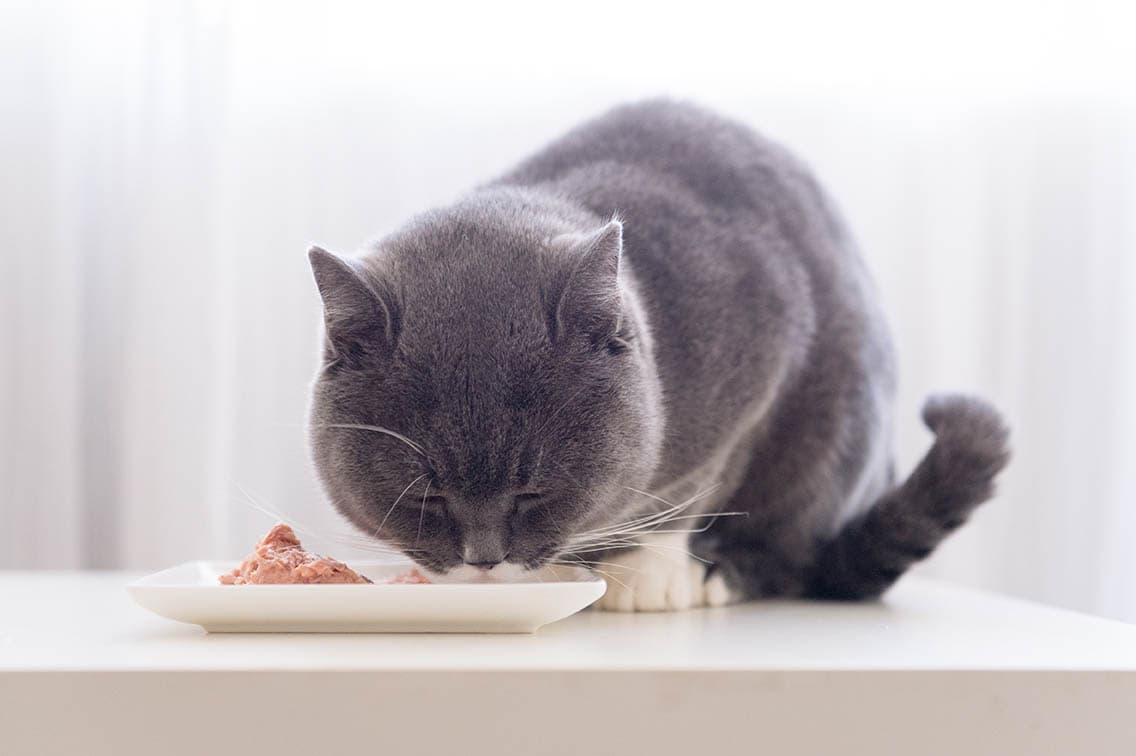
How Many Calories Exactly?
Your veterinarian can help you calculate exactly how many calories your cat should be consuming per day. They will take into account whether your cat has been spayed or neutered and their activity level. They will then work out how many grams (or ounces!) of your chosen food this equates to. When measuring out meals to meet this requirement, use a weighing scale, as cups are not accurate.
You will need to weigh your cat regularly and may need to reduce their calories once they start to gain weight—you don’t want to tip them over into obesity!

Are There Any Supplements That I Should Use to Get My Cat to Gain Weight?
There are no specific supplements that are recommended to give to cats to help them gain weight. Adding supplements to meals can cause a diet to become imbalanced and lead to nutrient deficiencies. Consult with your veterinarian before deciding to add something to your cat’s diet over the long term.
My Cat Really Doesn’t Like Any Commercial Foods! Can I Cook for Her?
Everyone loves a home-cooked meal! Unfortunately, it isn’t as simple as throwing together some nice-looking ingredients together in a bowl when it comes to your cat. If meals are not complete and balanced, nutrient deficiencies can develop over time. If you are keen to cook for your cat, source your recipes from a board-certified veterinary clinical nutritionist. They can work with you to create a tailored meal plan that matches your cat’s needs and preferences.
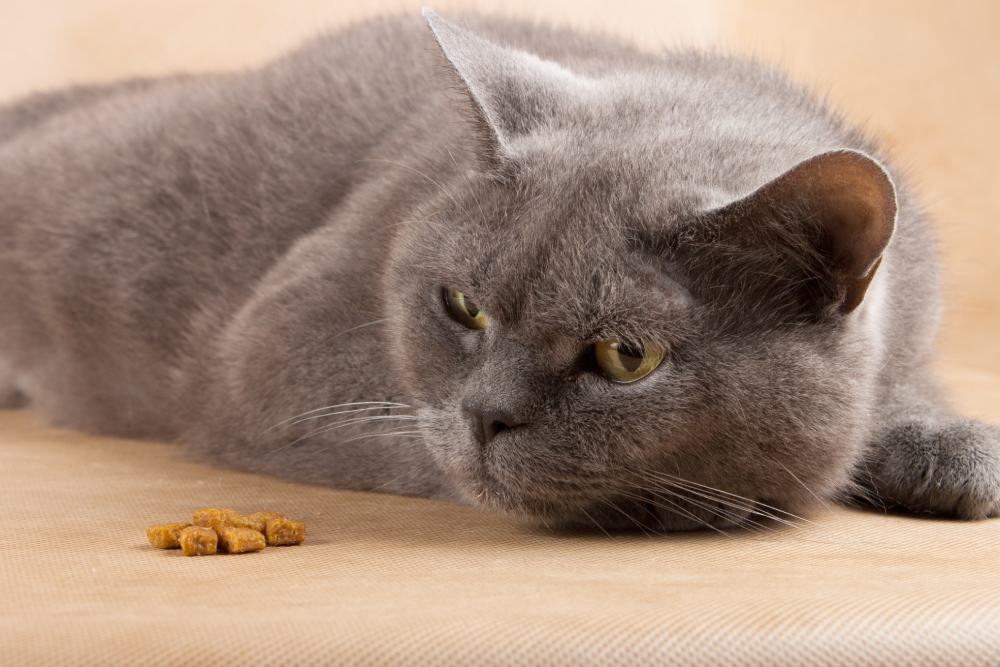

Why Is My Cat Not Eating?
Assuming your cat is otherwise well, there are some things that can put a cat off their food. Cats are prey animals and may not eat if they feel under threat.
Cat Mealtime Anxiety
Something to look out for as a reason that your cat may not be eating enough is anxiety surrounding mealtime. Ensure that there isn’t anything that may be stressful in the environment preventing your cat from eating comfortably. Any changes in the household, including the introduction of a new person or the rearrangement of furniture, can cause unease and inappetence.
Cat Food Bowl Access
- Can your cat easily get to the food bowl at all times? — If the food bowl is at a height, make sure your cat can easily reach it. Older cats may start to struggle with arthritis, making it harder for them to reach their bowl. The same consideration should be taken for bowls that are in rooms that are very busy during the day, as shy cats may be hesitant to eat even when they are hungry.
- Is there any competition in the household for the food bowl from other pets? — If your cat is fed freely with other cats in the home, make sure that there is at least one bowl per cat, plus one extra. This will prevent resource guarding and bullying for food among household companions. You may need to feed shy cats in other rooms to help them get enough to eat.

Conclusion
Most cats are overweight, not underweight, so before you embark on a mission to get your cat to gain weight, it’s best to check with a veterinarian that weight gain is needed. They can also make sure there’s nothing amiss that might explain why your cat is underweight.
Once your vet has given you the go-ahead, they’ll help you work out how many calories your pet needs to eat. You may also need to look at your cat’s home environment to make sure they’re getting all the food they need.
See Also:
Featured Image Credit: Ivonne Wierink, Shutterstock
Contents
- How Do I Know If My Cat Is Underweight?
- How to Get an Older Cat to Gain Weight?
- What If My Cat Is Losing Weight?
- What Can I Feed My Cat to Gain Weight?
- How Many Calories Exactly?
- Are There Any Supplements That I Should Use to Get My Cat to Gain Weight?
- My Cat Really Doesn’t Like Any Commercial Foods! Can I Cook for Her?
- Why Is My Cat Not Eating?
- Conclusion

